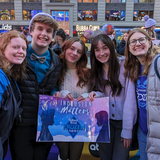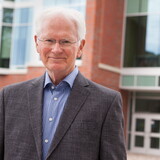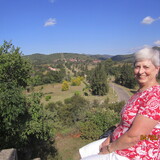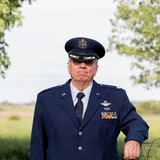Fifteen student members of Nebraska Wesleyan’s Global Service Learning organization traveled to Rosebud Indian Reservation during their recent winter break hoping to help its residents clean, sort, and organize a thrift store.
That task was accomplished. Perhaps their bigger accomplishment was the life lessons they brought back to Lincoln.
“We got in return much more than we gave,” said senior Erin Kinberg.
The group spent one week on the Indian reservation located in south central South Dakota, just across the Nebraska state line.
They purposely planned a winter break close to home not knowing the experience would be so foreign.
The students saw poverty firsthand — 97 percent of the reservation lives below the poverty line. The average lifespan of their residents is 51 years and the high school dropout rate is 70 percent.
They witnessed problems with alcoholism and homelessness, and heard stories of astounding suicide rates — some of the highest in the country.
They watched residents pay $1 to eat one of their only warm meals of the day at a local welcome center and shop for used clothes. They talked to a local woman concerned the high school prom would be cancelled because the high school girls did not have access to nice dresses.
“We have huge problems but we’re strong capable people who need a little help,” one elderly woman told the group.
The social problems were troubling but NWU students found hope.
“They are not all drunk and desolate,” said Kelli Wood, service learning and global service learning coordinator who along with two professors accompanied students on the service trip. “Within themselves they are trying to make a difference.”
The group met several local heroes who are working with high school students, hosting camps and trying to make that difference.
“The Lakota people love to talk and tell stories,” said Kinberg. “They taught us about life…about the importance of taking the time to listen, live life in the present, to forgive.”
“They shared with us how everything is connected and how we are all a part of God’s earth,” Kinberg continued.
When the students left Rosebud, they said they felt grateful for the experience. And upon their return to Lincoln, they asked their fellow students and faculty and members of the community for clothing donations to give to the Rosebud Indian Reservation.
That call resulted in 115 bags of clothes, 157 pairs of shoes, 300 pairs of pants, 131 prom dresses and eight sleeping bags that will help a few more homeless people avoid frostbite.
“The prom will go on,” said Kinberg.

















